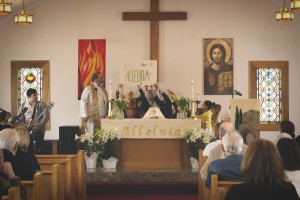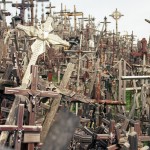If you were inventing a story that you wanted people in the ancient world to believe as fact, the last thing you’d want to do is start with a woman seeing someone walking around alive whom everybody already knew was dead as a doornail.
Almost no one in the ancient world accepted the word of a woman as an eyewitness: not in court, not in a family dispute, not in everyday life. They were not considered reliable.
Silly of the ancients to be that way about women but that’s the way it was. And it’s one of the reasons the gospel accounts of the resurrection are believable.
Mary Magdalene—from whom Jesus cast out many demons before she repented and followed him to the bitter end and beyond—is the first disciple to whom Jesus appears.
Not just a woman but that woman, a woman who was possessed … ‘don’t you remember?’ some must have said. Folks in Rome or Jerusalem or Athens or Corinth were supposed to buy this story? No, these eyewitness accounts aren’t made up. They tell it like it was—like it is—and leave belief to us.
Now, they had beaten Jesus so badly before they nailed him to the cross that he would likely have died anyway. He lasted in extreme agony for three hours on the cross. He bled out before they put a spear through his dead heart. The cross was overkill: brutal, nasty, unjust, and inexcusable. But it’s what we humans do when God shows up.
And, yet, here Jesus is with Mary in the garden. Alive. Embodied. A tremendous mystery. Because that’s what God does: he turns our great treachery and our brutality into a Tree of Life for all.
The wounds are visible in his hands and feet but somehow transfigured. He knows who he is and who Mary is, as though he had just been taking a nap since Friday afternoon.
Mary Magdalene sees Jesus and supposes, at first glance, that he is the Gardener. Gardener.
Adam and Eve were gardeners; that’s the job God gave them in the beginning. Now, the New Adam—Jesus—who’d gone to a garden to cry out to his Father before this whole bloody business started, who’d died in agony on a tree near a garden, and who’d been buried in a garden, looks up from his chrysanthemums, wipes the dirt from his tilling hands, and stands to greet Mary.
She is walking away, dejected, in tears. He stops her because he wants to know why she is weeping. She mumbles something about a dead man that’s missing and asks did he carry his body somewhere else, probably looking away from Christ in sorrow.
Then Jesus grabs her attention: “Mary!” She recognizes his voice when he calls her by name, and in half disbelief cries out, “Teacher!” and clings to him with such joy and abandon that Christ has to pull her away.
This is person-to-person. This is real. This calls for our trust and faith. It beckons to something deep inside each of us. Christ is risen!
But let’s stay with Mary’s tears for a moment.
It’s important to say this even as we celebrate the resurrection of Jesus: We don’t get to this wondrous moment of recognition, reunion, and belief except by a horrible, unjust, unthinkable death in which all but the female disciples and John abandon Jesus.
We also don’t get to this heart-quickening, world-defeating victory of the Spirit over the powers and over death without the darkness of Holy Saturday, when and where all seemed lost.
Holy Saturday is where the world lives now, awaiting resurrection. There is darkness that remains despite all Easters. Christians need to be honest about this reality even as we boldly confess and proclaim the reality of the Resurrection.
Those who follow Christ don’t live in denial, certainly not about the pain and tragedy of existence.
Miscarriages of children. Miscarriages of justice. Senseless killings. In Kenya, this Holy Week, 147 young Christian men and women gunned down in the prime of their lives by fanatics. Broken bones that don’t heal right. Marriages that are on life support. Cancer. Parkinson’s. MS. Lost homes. Lost jobs. Lost children. Wars that claim our loved ones.
When we live in denial about these and other real life struggles—and denial can be simply tuning out the darkness with false enthusiasm—it’s hard for the world to receive our very good news that all of this death is not the end; that the death of Jesus means that death is now everywhere in retreat, even if we cannot always see that.
It’s also harder for us to engage suffering strangers and acquaintances with authentic compassion, mercy, and empathy when we refuse to stay with Jesus at the crosses or tombs of life. It’s hard to be patient in our own sufferings, or endure the anguish of those closest to us—to see them as a participation in Christ’s hardships—when we expect every day to be Easter.
When we live in denial, it’s hard to sustain honest community, to engender churches where folks who doubt and struggle with faith and obedience are as welcome as those who are certain and assured; where those who labor in the heat all day are glad for the companionship of those who show up for work at the last minute.
It’s hard to keep it real when you are living Easter in denial; in denial that others—others in the pew next to yours—are living Holy Saturday or even—Christ, have mercy—gutting it out through a personal Good Friday.
In what might be called a contemporary hymn, “Wake Up Dead Man,” Bono, of the Irish band, U2, writes about a friend who dies in an apparent accident:
Jesus, were you just around the corner?
Did you think to try and warn her?
Were you working on something new?
If there’s an order in all of this disorder
Is it like a tape recorder?
Can we rewind it just once more?
Then the singer cries out:
Wake up, wake up dead man.
Wake up, wake up dead man.
Wake up, wake up dead man.
It’s honest, not blasphemous, that the protagonist of the song asks Jesus quite frankly—in a very particular instance of tragedy—‘where were you … where are you?’
It’s reminiscent of the Psalms and of Isaiah: “Awake, why do you sleep, O Lord?” … “Arise, cast us not off forever. Awake, awake, put on strength, O arm of the LORD.”
We see this, too, in Mark’s Gospel: “Jesus was sleeping at the back of the boat with his head on a cushion, the disciples woke him up, shouting, ‘Teacher, don’t you care that we are going to perish?’”
It helps, perhaps, to remember that ‘asleep’ and ‘dead’ are used interchangeably in the Bible.
Wake up dead man!
It’s a hymn about doubt but it’s really—at its depths—a hymn of faith, crying out to the Risen Christ, ‘Wake up!’
Yet in this time before Christ arises and returns—as we endure our personal and corporate seasons of trial and torture, dying and burying; in this time before Christ’s kingdom comes here on earth as it is in heaven—we do not wait as those without hope.
We wait in a tension between the darkness of Holy Saturday and the bright promise of Easter. Some days we have faith and on other days, as one of my sisters in this congregation wrote yesterday, we must rely on the faith of others, on the faith of the gathered church. We are not saved alone but accompanied in this journey by the body of Christ.
And as we stare this present darkness down together we have a message to deliver: The Resurrection is something that is already at work in the world. Jesus is but the first fruits. We are all of us baptized into his death and resurrection.
Resurrection life dwells—abides—in us. Rob Bell says that “Resurrection means God has not given up on the world because this world matters”:
This world of dirt and blood and sweat and skin and light and water. This world that God is redeeming and restoring and renewing. Greed and violence and abuse—they are not right—and they cannot last. They belong to death and death does not belong.
Resurrection says that what we do with our lives matters…in this body the one that we inhabit right now. Every act of compassion matters. Every work of art that celebrates the good and the true matters. Every fair and honest act of business and trade. Every kind word. They all belong and they will all go on in God’s good world. Nothing will be forgotten. Nothing will be wasted.
Jesus expects us to have faith amid the darkness. As Christ pulled the hand of Thomas toward his sacred, transfigured wounds, he said to him “Put your finger here, and look at my hands. Put your hand into the wound in my side. Don’t be faithless any longer. But believe!”
“My Lord and my God!” Thomas exclaimed. Then Jesus tells him, “You believe because you have seen me. Blessed are those who believe without seeing me.”
John Updike, a contemporary American writer, was one of those who, like us, never saw the resurrected Christ for himself and yet he believed.
In 1960, as a young man, he entered a poetry contest at a Methodist church in Massachusetts. He won the prize: $100. And he gave the money back to the church, but the real miracle is the poem itself, “Seven Stanzas at Easter”:
Make no mistake: if He rose at all
it was as His body;
if the cells’ dissolution did not reverse, the molecules
reknit, the amino acids rekindle,
the Church will fall.It was not as the flowers,
each soft Spring recurrent;
it was not as His Spirit in the mouths and fuddled
eyes of the eleven apostles;
it was as His flesh: ours.The same hinged thumbs and toes,
the same valved heart
that–pierced–died, withered, paused, and then
regathered out of enduring Might
new strength to enclose.Let us not mock God with metaphor,
analogy, sidestepping, transcendence;
making of the event a parable, a sign painted in the
faded credulity of earlier ages:
let us walk through the door.The stone is rolled back, not papier-mâché,
not a stone in a story,
but the vast rock of materiality that in the slow
grinding of time will eclipse for each of us
the wide light of day.And if we will have an angel at the tomb,
make it a real angel,
weighty with Max Planck’s quanta, vivid with hair,
opaque in the dawn light, robed in real linen
spun on a definite loom.Let us not seek to make it less monstrous,
for our own convenience, our own sense of beauty,
lest, awakened in one unthinkable hour, we are
embarrassed by the miracle,
and crushed by remonstrance.
Now that’s a description of Easter. It’s material and it’s supernatural all at once.
And so, with Updike and with the Magdalene, through tears—even as we suffer and rejoice and believe and expect a miracle in this space between Holy Saturday and Easter—we find ourselves once again on the road to Bethany and, with Martha, we encounter Jesus, and we hear the words of the Teacher:
“I am the resurrection and the life. Anyone who believes in me will live, even after dying. Everyone who lives in me and believes in me will never ever die. Do you believe this?”
Do we believe this? Do we believe we will be raised as he was raised?
Christians do not believe we “go on” as stardust or as a “whisper on the wind” or “wave upon the shore”—or other such greeting card nonsense that somehow sells so well—nor do we hope to live on merely in the minds of those who remember us, as beautiful and true as those memories are; we believe we truly live on as the unique and unrepeatable persons we have been since the moment of our conception.
We live on—body and soul glorified—as it was with Jesus in the Garden and in the Upper Room—the first fruits of the Resurrection—able to be touched and held, seen and heard. We sit down, as Isaiah foretold, at a meal in Christ’s New Creation and drink choice wine with the One who loves us and gave himself for us.
We are not ghosts in machines that go back to being ghosts, nor are we mere material that becomes “one” again with the rest of creation. Whatever that means. The Christian hope is particular, personal, and unapologetically material.
We are destined for eternal embodied existence, where all the things that made us who we are as one-of-a-kind divine image bearers—laughter, courage, generosity, brilliant thoughts and selfless deeds, skin and bones—will inhabit individual bodies that have something resembling hands and feet and fingerprints and nucleic acids. All made alive again forever—somehow—redeemed by the humble power of the triune love.
God keeps all the information (genetics) and all the mystery (the essence of every human soul) about us, and he knows how to raise us from death. That is a real hope. That is a real love.
I think the Resurrection will be a lot like when Samwise Gamgee encounters his mentor and friend at the end of their great journey together:
“Gandalf! I thought you were dead! But then I thought I was dead myself. Is everything sad [now] going to come untrue? What’s happened to the world?”
“A great Shadow has departed,” said Gandalf, and then he laughed and the sound was like music, or like water in a parched land.
Jesus is that living water. This High Priest of ours understands our weaknesses, for he faced all of the same testing we do, yet he did not sin.
In Jesus, God became vulnerable to us. God drew near to us—drew close enough to feel the kiss of Judas, to hear Peter’s denial, to bear our mocking, rejecting ‘crucify him!,’ to endure Pilate’s horrific death sentence. Instead of ‘sinners in the hands of an angry God,’ I confess what William Paul Young says about the cross—it’s actually ‘God in the hands of angry sinners.’
And for Christ’s vulnerability and identification with us unto death, the Spirit raises him forever—and us with Christ.
And so the great Easter sermon of our brother, Chrysostom:
If any have worked in the vineyard from the first hour, come receive your rightful due. If any have come after the third hour, come celebrate this great feast of Resurrection with thankfulness. If any have come after the sixth hour, let him not be in doubt, for he will suffer no loss. If any have delayed until the ninth hour, let her not hesitate but draw near. If any have arrived only at the eleventh hour, let him not be afraid because he comes so late.
For the Master is generous and accepts the last even as the first. He gives rest to him who comes at the eleventh hour in the same way as her who has worked from the first.
Enter then, all of you, into the joy of our Lord.
First and last, receive alike your reward. Rich and poor, dance together. You who fasted and you who have not fasted, rejoice together. The table is fully laden: let all enjoy it. The calf is fatted: let none go hungry. Let none lament his poverty; for the Kingdom is revealed. Let none bewail his sins; for the light of forgiveness has risen from the tomb. Let none fear death; for the death of the Savior has set us free.
He has destroyed death by undergoing death. He has despoiled hell by descending into hell. He vexed hell even as it tasted of His flesh. Isaiah foretold this when he cried: Hell was filled with bitterness when it met You face to face below; Hell was filled with bitterness, for it was brought to nothing; filled with bitterness, for it was mocked; filled with bitterness, for it was overthrown; filled with bitterness, for it was put in chains. Hell received a body, and encountered God. It received earth, and confronted heaven.
O death, where is your sting? O hell, where is your victory? Christ is risen! And you, o death, are annihilated! Christ is risen! And the evil spirits are cast down! Christ is risen! And the angels rejoice! Christ is risen! And life is liberated! Christ is risen! And the tomb is emptied of its dead; for Christ having risen from the dead, is become the first-fruits of those who have fallen asleep. To Him be Glory and Power, now and forever, and from all ages to all ages. Amen!












